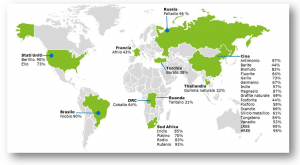Strategic Material
Ensuring secure and stable access to certain raw materials has become a global priority
Raw materials are not only essential for the production of a wide range of products and services used in everyday life, but also for the development of important innovations within the European Union, which are necessary in particular for the development of new technologies that are more environmentally sustainable and globally competitive.
The acceleration of technological innovation cycles and the rapid growth of emerging economies has led to an increase in the global demand for highly sought after metals and minerals.
Ensuring secure access to a stable supply of many raw materials has become a major challenge for both national and regional economies with limited production capacity, such as the European economy, which depends on the importing of many of the minerals and metals needed by industry, including numerous essential raw materials.
Discover the list of raw materials
(source European Commission)
Since these raw materials are produced mainly outside the European Union, it is important to recover them from products that are widely used on the European market with particular reference to WEEE-waste electrical and electronic equipment that contain large quantities of them.
From WEEE it is therefore possible to extract the precious metals classified as Platinum Group Metals (PGMs: Platinum, Palladium, Rhodium, Ruthenium, Iridium, osmium) as well as rare earths that are not produced within the European Union and for which 95% of the supply comes from China.
Today, however, the quantity and quality of recovered material must be improved by experimenting and using new technologies.
